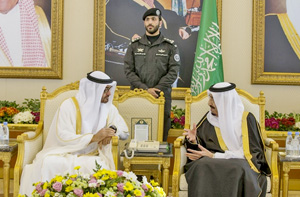Jeddah, Feb 17: Custodian of the Two Holy Mosques King Salman and Abu Dhabi Crown Prince Sheikh Mohammed bin Zayed Al-Nahyan, deputy commander of the UAE armed forces, held talks in Riyadh on Monday, opening a new era in Saudi-UAE strategic ties.
“King Salman and Sheikh Mohammed explored prospects of expanding cooperation between the two countries and discussed major regional and international developments,” said an official statement.
Crown Prince Muqrin, deputy premier, Riyadh Gov. Prince Faisal bin Bandar, National Guard Minister Prince Miteb bin Abdullah, Deputy Crown Prince Mohammed bin Naif, second deputy premier and minister of interior, and Defense Minister Prince Mohammed bin Salman attended the talks.
King Salman earlier received Sheikh Mohammed at Riyadh airport, breaking royal protocols, reflecting the strong relations between the two GCC countries and their joint push for bolstering regional stability.
King Salman also hosted a luncheon at his palace in honor of Sheikh Mohammed and his accompanying delegation. Senior princes, ministers and high-ranking officials, attended the banquet. Sheikh Mohammed left Riyadh later in the day.Saudi academics and economists have highlighted the strong relations between Saudi Arabia and the UAE and its strong impact on regional security and stability. Wahid Hamza Hashim of King Abdulaziz University described the two countries as strategic partners. “There has been good coordination and cooperation between them for the past several decades,” he said.
Fahd bin Siban Al-Sulami, a member of the board of directors of Jeddah Chamber of Commerce and Industry, said the visit of Sheikh Mohammed and his meeting with King Salman reflected the strong and strategic ties.
UAE Economy Minister Sultan Al-Mansouri said there is good understanding between Riyadh and Abu Dhabi on political and economic issues. “Our two countries represent the largest economies in the Middle East,” he said, adding that their bilateral trade crossed SR75 billion. “This figure represents about half of the total trade between the six GCC countries,” he pointed out.





Comments
Add new comment